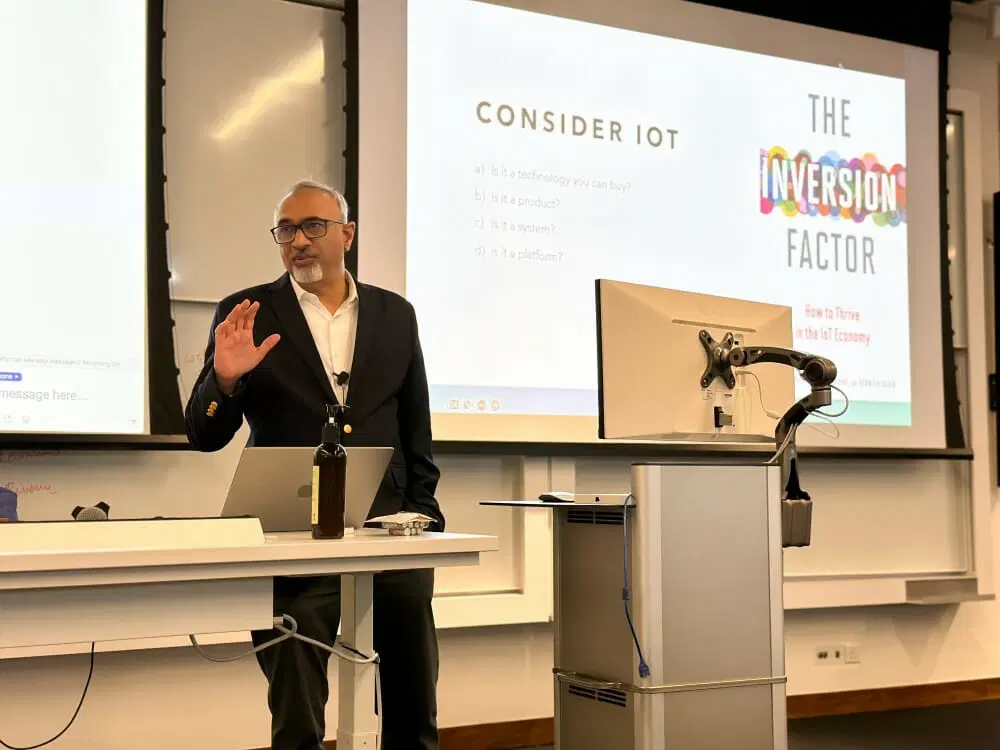The future is always unpredictable, and that’s part of the challenge. A leader must be agile and humble enough to rethink plans as needed. As Eisenhower said, “I love planning, but I hate plans.” When facts change, be ready to adapt while staying focused on the ultimate goal.
Sanjay Sarma is the CEO, President, and Dean of the Asia School of Business and a widely influential leader in education. He shares his backstory, beginning with an engineering degree from IIT Kanpur, and his advice for leaders who find themselves in turbulent times.
Thank you so much for your time! I know that you are a very busy person. Our readers would love to “get to know you” a bit better. Can you tell us a bit about your ‘backstory’ and how you got started?
Igrew up in India, got my engineering degree from IIT Kanpur, and worked in the oil industry in Scotland. After grad school at CMU and UC Berkeley, I joined MIT as an assistant professor in 1996. Since then, I’ve worked with amazing students, colleagues, and industry partners to invent and commercialize new technologies. I’ve also had the good fortune to work on education innovation including new educational institutions.
Is there a particular person who you are grateful towards who helped get you to where you are?
I’ve had many people help along the way. My PhD advisor, Professor Paul Wright, was a big influence. He was creative and open-minded and pushed me to let go of my inhibitions and pursue new ideas.
When your organization started, what was its vision and purpose?
The Asia School of Business was created to develop global leaders with a focus on leadership, ethics, and transformation. We’re in a rapidly changing region, and we need leaders who can guide companies, social enterprises, and governments through challenges like climate change, sustainability, and AI.
Can you share a story about how you lead your team during uncertain times?
Education is in a time of change, and in a crisis, it does not necessarily recognize or acknowledge. “Democratizing education” is good, a bit cliched as a rallying call. At MIT, we did so by focusing instead on principles and pedagogy — and the science of learning. This made our focus clear, unique and, therefore, empowering. It wasn’t just words — it was principles.
Did you ever consider giving up? Where did you find motivation?
Yes, I’ve had moments of doubt. But experience teaches you that hitting a wall often sparks creativity. Necessity is the mother of invention, and those moments of challenge are where new ideas emerge.
What is the most critical role of a leader during challenging times?
The leader’s role is to keep the team focused on the mission and understand that setbacks will happen. Prioritization is key — leaders need to guide the team through competing objectives and keep the long-term vision in sight.
What is the best way to boost morale and engage your team?
A leader must also keep the team focused on *why* the mission matters. Acknowledge challenges, but emphasize perseverance. It’s crucial as well to create an environment where the team feels empowered to provide feedback and be part of the decision-making process.
How can a leader make plans when the future is so unpredictable?
The future is always unpredictable, and that’s part of the challenge. A leader must be agile and humble enough to rethink plans as needed. As Eisenhower said, “I love planning, but I hate plans.” When facts change, be ready to adapt while staying focused on the ultimate goal.
Is there a number one principle that can help guide an organization through turbulent times?
One of the most important principles is focusing on why we’re doing what we’re doing. That long-term vision keeps everyone motivated and aligned, especially when times are tough. Just like raising a family — focus on the ultimate goal, the well-being of the next generation, and you can weather most storms.
What are the five most important things a leader should do to lead during uncertain times?
- Stay focused on the mission and vision.
- Allow your team to shape the plan and provide feedback.
- Foster chemistry and reduce power dynamics.
- If someone doesn’t want to be part of the change, it’s best they move on. For both parties.
- Keep things informal — don’t take yourself too seriously, but always take the mission seriously.
Can you give us your favorite “Life Lesson Quote”?
I don’t have a specific quote, but I often remind myself that when I’m stuck, it’s because I lack a long-term vision. A clear long-term vision helps you navigate short-term obstacles.
How can our readers follow your work?
I’m not on social media, as I foresaw it being a net negative for me personally. However, my work at Asia School of Business, MIT, and my public talks are widely available for those interested.
Thank you so much for sharing these important insights. We wish you continued success and good health!
Originally published by Medium.





